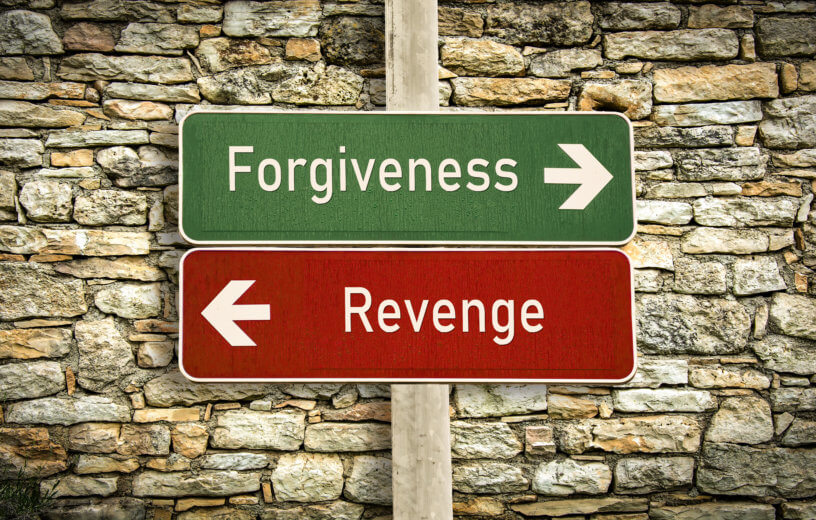If you had a magic wand, would you choose revenge or forgiveness? I must admit, I’m very tempted by revenge. I have enjoyed Denzel Washington’s The Equalizer movies. There’s also the classic revenge movie – Death Wish. I remember watching this many years ago. There’s a certain level of satisfaction when “justice is served” to people who deserve it.
There are a few issues with revenge. First and foremost, it usually flies in the face of legality and morality. Also, who determines what is just? Is justice the same for me as it is for you? Is there a case for choosing forgiveness from the start?
I admit that I fall for desiring revenge often. I usually don’t act on this desire, primarily because of my Christian value system. I was taught that forgiveness should be our primary response to being wronged. I struggle with that some times.
I recently listened to a great audiobook entitled “The Dead Drink First.” This book was primarily about the search for the remains of a soldier who died on the island of Okinawa in World War Two. The story is also about traumatic brain injury, and how it impacts people’s personality. The father of the author was on Okinawa and sustained a significant brain injury. This changed his personality, making him abusive and subject to raging anger. This altered personality had a profound impact on his two sons. One of them (the author’s younger brother, who bore the brunt of the father’s abuse) was interviewed at the conclusion of the story. While both sons never had the chance to reconcile with their father before he died, the younger one told how he forgave his father anyway. He said he had to forgive his father in order to work on his own issues. This struck me, and I decided to research the power of forgiveness.
I found many articles that supported the Biblical view on forgiveness, which didn’t surprise me. The Bible is full of many teachings and examples of forgiveness. I wanted to see if there were other, secular sources that validated why forgiveness should be our default instead of revenge.
I found four interesting articles from various sources. These sources included Psychreg (published by Psychreg Ltd, a media company based in London, United Kingdom), Harvard Health Publishing, Huffpost, and John Hopkins Medicine. None of these four sources would be deemed “Biblical” in their approach, so I took a deeper look.
In Psychreg’s post “The Power of Forgiveness” (https://www.psychreg.org/power-of-forgiveness ), the author shared three reasons why forgiveness is hard to do:
- There is too much anger involved
- Believing that the person who wronged you deserves punishment
- Fear of getting hurt again
While forgiveness is hard and painful, this article shared the results of studies that say that forgiveness is powerful, and has both health benefits as well as social and emotional benefits.
Harvard Health Publishing’s “The Power of Forgiveness” (https://www.health.harvard.edu/mind-and-mood/the-power-of-forgiveness) talked about the long-term effects of forgiveness. “Forgiving a person who has wronged you is never easy, but dwelling on those events and reliving them over and over can fill your mind with negative thoughts and suppressed anger,” says Dr. Tyler VanderWeele, co-director of the Initiative on Health, Religion, and Spirituality at the Harvard T.H. Chan School of Public Health. “Yet, when you learn to forgive, you are no longer trapped by the past actions of others and can finally feel free.”
They also stated that there are two types of forgiveness: decisional and emotional and gave a formula for approaching and executing forgiveness. “Forgiveness is not erasure,” says Dr. VanderWeele. “Rather, it’s about changing your reaction to those memories.”
Huffpost’s “The Power of Forgiveness” (a blog by Dr. Randy Kamen, which can be found at https://www.huffpost.com/entry/forgiveness_b_2006882) details powerful health benefits of forgiveness. There were two quotes from this article that resonated with me:
- “Forgiveness is something different, which is to say, I am not going to have these negative emotions consume me. That’s how I view it. And so forgiveness isn’t so much about the other person as your own process of saying, I’m moving forward.”
- “Forgiveness training is a combination of cognitive behavioral therapy and relaxation techniques, but the goal is the same: Identify the problem, give it time and get objective input.”
As I completed my quick review of the power of forgiveness, I came to realize that there are numerous secular and Biblical reasons to forgive. In addition to the moral reasons, there are documented health benefits to forgiveness. The result of forgiveness is a liberation from the wrongs and grudges so easily held onto.
I’ve experienced this liberation numerous times. By letting go of the wrongs done to me (even if they are only my perceptions), I’ve freed myself from an amazing flood of negative emotions. After reviewing the scientific research available, I appreciate the validation of others that forgiveness is the better approach, and has positive benefits to the forgiver.
I find that sometimes the toughest person to forgive is myself. As a leader, I always am harder on myself than I am on others. I now realize that the first person I need to forgive is usually myself! I find it hard to forgive others if I’m not letting go of the mistakes I’ve made.
I’d love to add value to you by sharing my journey of forgiveness, and how I’ve liberated myself and coached others to achieve greater things. Are you holding a grudge against someone that you just can’t seem to let go? I challenge you to read the four articles I’ve mentioned in this post. Perhaps they can help you as they’ve helped me.
Have you experienced the liberating power of forgiveness? How did you progress from that point? Let me know in your comments and replies to this article. Contact me at mike@mrhensonllc.com if you’d like to discuss in private.
